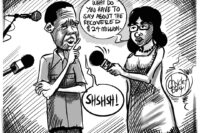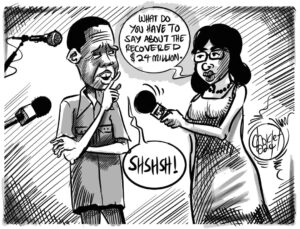Centre for Trade Policy and Development (CTPD) executive director Isaac Mwaipopo says the motion of impeachment against President Edgar Lungu does not paint a good picture of the country to the outside world.
And Mwaipopo says Zambia’s chances of securing the much sought after IMF bailout package largely depends on how much progress the country has made in addressing the perceived risks of default that proved problematic in the past, as well as the progress made in implementing policy recommendations under the economic recovery plan that the country embarked on.
Responding to press query, Mwaipopo noted that the motion to impeach the Head of State raised serious governance questions and the nation’s stability.
“The impending visit of the IMF team creates a lot of anxiety and interest among many stakeholders and citizens that have been following the $1.3 billion bailout package negotiations, which the country has been pursuing since 2016. It is not clear whether this coming visit will yield much positive results in light of the recent happenings in the country such as the impeachment motion raised by the opposition political party and the recent cabinet reshuffles that saw a change in key ministries, including the Ministry of Finance,” Mwaipopo stated.
“It must be borne in mind that our chances of securing this much sought after bailout Package largely depends on how much progress we have made as a country in addressing the perceived risks of default factors that proved problematic in the past as well as Zambia’s progress in implementing policy recommendations under the Economic Recovery Plan, developed by ourselves with the support of cooperating partners. Lending by the IMF is guided by three broad factors; the economic environment of a nation seeking a package, the political status of a nation and institutional factors which all form part of the risk analysis.”
Mwaipopo observed that Zambia’s debt to GDP ratio was very high at over 50 per cent, as viewed by the IMF.
“As things stand, this picture has not improved and thus still remains unfavorable in the eyes of lenders. The current political situation in the country where some opposition political parties led by the United Party for National Development (UPND) have moved a motion to impeach the incumbent President, Mr. Edgar Lungu on allegations of constitutional violations, does not paint a good picture of the country to the outside world, as it brings into play questions around the governance record of the country. It also brings into question the stability of the government which is the prime debtor. It must be put on record that the initial negotiations with IMF were put on hold due to the observed increased borrowing appetite by government,” he stated.
“This raised a lot of questions on our ability to pay back when the time is due for repayment and according to the IMF communications director Gerry Rice, IMF needed more clarity on the country’s fiscal policy and also governments borrowing plans before any negotiations could resume. The IMF had declared that the nation was under high risk of debt distress following the announcements which were made on unveiling new loans. The fund has in the past stressed that they needed greater information with regards to the total debt stock, clarity on who was being owed and how much the debt servicing obligations were costing the country. With all these queries, the IMF was simply weighing in on Zambia’s risk of default.”
Meanwhile, Mwaipopo charged that the sudden halt in negotiations between Zambia and the IMF could suggest that there could be other adjustments government might be reluctant on implementing.
“The IMF had also recommended that adjustments relating to government spending be made. Removal of subsidies which included fuel subsidies and subsidies that support fertilizer programs. In addition, government was expected to work on its fiscal deficits as well as putting in place measures to improve transparency and accountability. The government has since 2016 been implementing some of the IMF proposed measures which have led to an increase in fuel prices and electricity price. With the new round of talks this April, Zambia’s success to get the IMF bailout package is a matter that will be decided not only based on the adjustments made and to be made this far, but also in consideration of the broad changes and challenges the nation is currently dealing with,” stated Mwaipopo.
“It will be important for the country to clearly show the progress that has been made in implementation measures aimed at restoring fiscal fitness as this can help to accelerate the negotiations. To the new Minister of Finance, Honorable Margret Mwanakatwe, the task ahead of her is quite huge, it needs firmness and a lot of consultations, keeping an open door and listening to even those that might be perceived to hold a dissenting view.”












